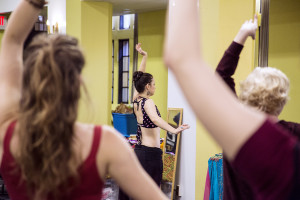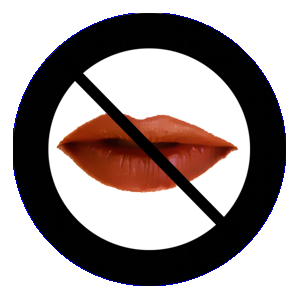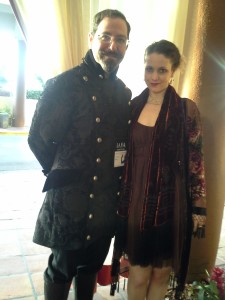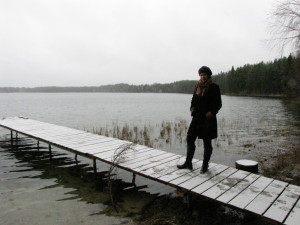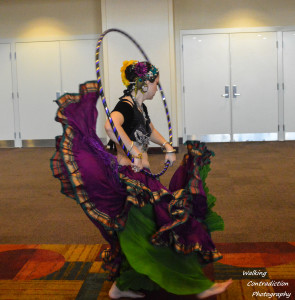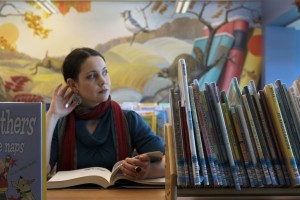I just got back from the annual conference of the American Association of Sexuality Educators, Counselors, and Therapists (AASECT). Since I’ve started doing more work as a sex educator, it made sense for me to go, and while I learned tons about sexuality, it also provided me with valuable opportunities to reflect on the connections between teaching, touching, and pleasure.
There’s a lot of concern in sexuality fields (particularly counseling and therapy) about maintaining ethical boundaries when practicing with a client. Obviously the same concern applies to sex educators too, but it seemed less pronounced. I attended one panel on the ethics of touch, which focused on touch-based practices like sex partner surrogacy and sexological bodywork. There’s so much ethical grey area around these professions that long-time AASECT board members were dodging the question of whether an AASECT certified therapist can even ethically recommend these kind of hands-on treatments to a client (even when it seems like the best modality to help that client). I listened in on related conversations, too, and those helped me put into context the real fear of bodily connection that many people in the sexuality field seem to have, because of how connecting through touch is seen as dangerous both since it risks intimacy that can compromise a professional relationship, and because it just looks bad to an erotophobic culture like ours (plus there are potential legal ramifications, because getting paid to touch people in certain ways is illegal in many parts of the world). Touch – especially sexual and/or pleasurable touch – is incredibly suspect to people today, and that’s a shame in my opinion, because it can definitely be healing.
The two main venues I teach in – the academic classroom and the dance classroom – allow me to handle connection in different ways. In the academic classroom, it’s rare that I have a reason to touch my students, which is fine by me. We do, however, spend a lot of time connecting intellectually. I believe that face-to-face conversations offer hugely important ways of conveying both information and critical thinking strategies, and I think my teaching would suffer if I had to give up the live, face-to-face component.
Unlike touch, I do try to incorporate pleasure into my academic teaching. I let it show when I’m excited about a topic. I praise students when they pick up a concept quickly or bring a pertinent example to class, knowing that many will receive a compliment with pleasure. I try to make things “fun” without capitulating to an all-play, no-work atmosphere. Pleasure is a frequent guest in my classroom, and I like it that way. If teaching and learning weren’t pleasurable, I’d wonder where I was going wrong. I think this helps in the creation of a safe space: my students trust me not to drag them through unnecessarily tedious or unpleasant stuff all the time, and to make topics fun and exciting, and so that when we do have to buckle down and do the hard work, they’ll be ready to come with me on that journey (at least, that’s what I like to believe is happening).
In the dance classroom, I do touch my students. I try not to do it very often, and I certainly keep it appropriate. I ask consent very frequently, even though they sign waivers before stepping into the studio with me. Here, as with the academic classroom, I believe it’s important to establish a precedent that involves a fair bit of trust. I think they need to trust that I won’t unexpectedly come up behind them and touch them without warning, which carries over from social norms in the rest of life. As in other areas of life, I try to model good consent practices, in part because lots of people don’t get this information elsewhere, and in part because it’s central to how I choose to live my life.
Pleasure also figures significantly in the dance classroom, especially for my main style of dance, belly dancing. It’s pleasurable to learn to skillfully move your body, and to adorn yourself to practice. I make a point of complimenting students when they do things right. The thrill of learning to improvise, as we do in American Tribal Style® Belly Dance, carries its own unique sense of enjoyment. As a dance teacher, I try to harness these modes of pleasure and give my students multiple opportunities to explore them.
Learning can be plenty intimidating: fear of failure, feeling stupid, not getting things right, feeling overwhelmed, ramifications for failure (like with grades or wasted money on a class), and so on. Having solid boundaries around touch (when it has a role in that kind of classroom) and incorporating pleasure can both be ways of engaging students and making them feel connected. I don’t think my use of touch or pleasure in either context is inappropriate, but the more I get into the sexuality field, the more I see people scrutinizing – and in some cases fearing – touch and pleasure. In these cases, I want to figure out what’s really going on, and then continue to do what I pride myself on: putting the students first.

